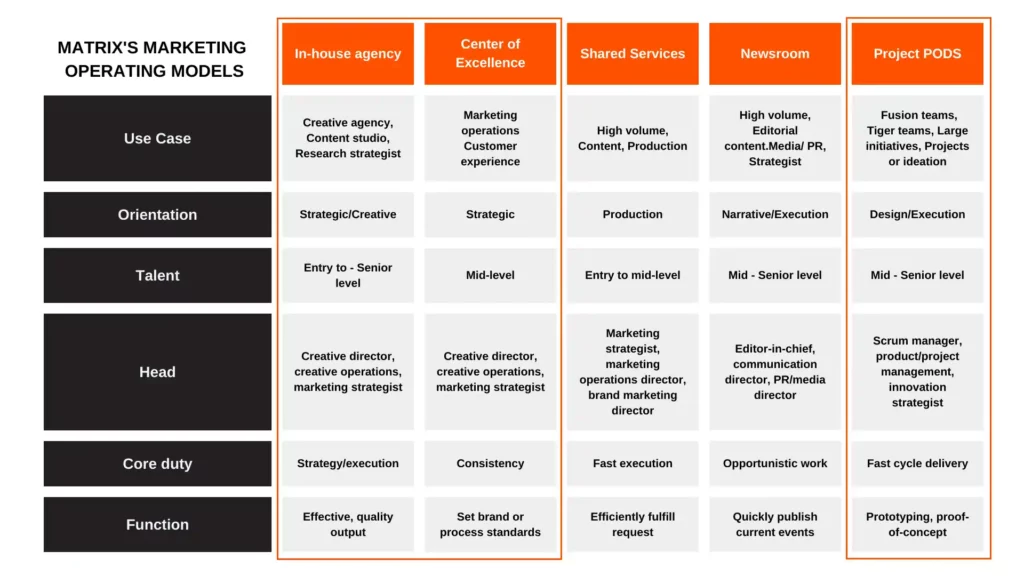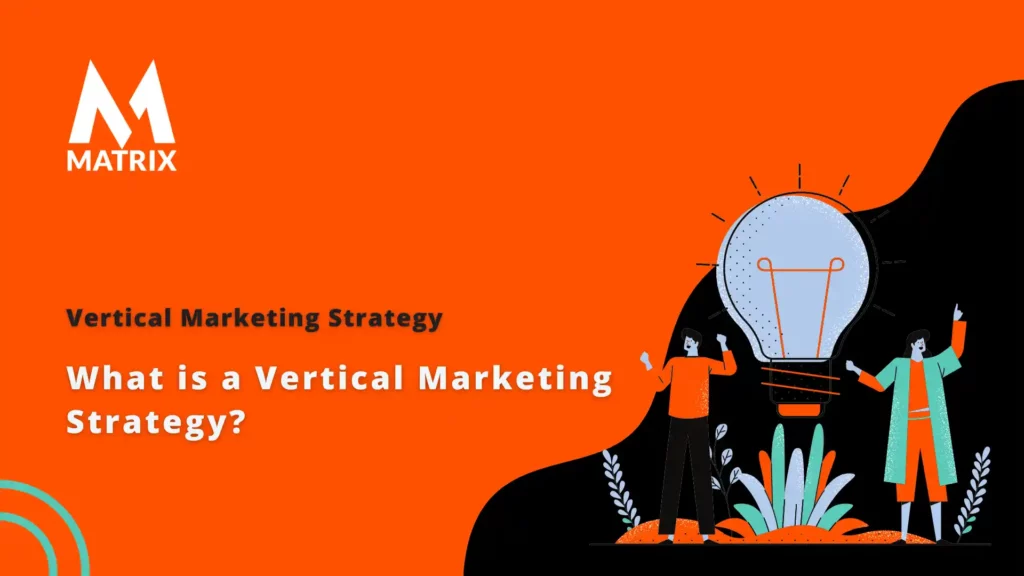What is a Vertical Marketing Strategy?
What is a Vertical Marketing Strategy?
Are you seeking a way to gain an edge in the competitive business world? A vertical marketing strategy involves business entities forming partnerships to produce and distribute products and services. This type of collaboration involves multiple companies working together in one supply chain.
The advantages of a vertical marketing strategy are numerous, including cost savings, increased efficiency, better control over pricing, and increased market share. Matrix Marketing Group and Microsoft also offer industry solutions to help businesses successfully deploy this model.
This blog post will explore how a vertical marketing strategy can benefit your organization, including vertical marketing vs. horizontal marketing, developing a vertical market strategy, and horizontal marketing strategy.
Are you looking to gain an edge in the competitive business world?
A vertical marketing strategy involves business entities forming partnerships to produce and distribute products and services. This type of collaboration involves multiple companies working together in one supply chain, from manufacturers to distributors to retailers. The advantages of account-based marketing include cost savings, increased efficiency, better control over pricing, and increased market share.
Businesses can easily deploy this model with the help of industry solutions offered by Matrix Marketing Group and Microsoft. An account-based marketing plan can benefit your organization significantly by providing cost savings, increased efficiency, better control over pricing, and increased market share.
Much like ABM, vertical marketing starts with researching a target vertical and focusing your strategy on attracting and closing those times of companies.
What is a Vertical Marketing Strategy?

Vertical marketing is a strategic approach that involves two or more companies working together in the same supply chain, from manufacturers to distributors to retailers. This partnership aims to produce and distribute products and services more efficiently and cost-effectively and effectively control pricing across all levels. This collaboration allows for increased market penetration and higher customer satisfaction through improved customer service and better product availability.
One key advantage of using account-based marketing is cost savings. By collaborating with other companies in the supply chain, businesses can benefit from each other’s buying power and reduce operational costs associated with inventory management, warehousing, and shipping logistics. Additionally, by pooling resources across different levels of the supply chain, companies can reduce labor costs associated with marketing, research, and development.
Another important advantage of vertical marketing is increased efficiency. By streamlining operations between multiple partners in the supply chain, companies can reduce the time it takes for products to reach customers and improve customer response times. Furthermore, with increased cooperation between manufacturers and retailers in product design and innovation, businesses can stay ahead by offering new products before competitors.
Moreover, vertical marketing helps firms gain greater control over pricing across channels since sales prices are predetermined between partners in the supply chain instead of being determined by market forces alone. This helps businesses maintain competitive prices while increasing their profit margin, where margins on certain products or services are sold at higher prices on certain channels than others.
Finally, this type of collaboration allows businesses to increase their market share by appealing to new customer segments or expanding existing ones to capture an even larger portion of a given market’s potential demand.
With access to wider distribution networks through partnerships with other firms in the supply chain, businesses can reach untapped markets that were previously inaccessible due to geographic limitations or limited available resources.
Matrix Marketing Group and Microsoft offer industry solutions that help businesses successfully deploy account-based marketing while maximizing its potential benefits, including cost savings, increased efficiency, better control over pricing, and increased market share.
With years of experience helping clients develop successful strategies for leveraging partnerships within their respective industries, these services guide how organizations can optimize their operations for maximum success. How to Choose the Right AI Digital Marketing Agency: A Comprehensive Guide for Marketing Managers
What is account-based marketing?

Account-based marketing is an approach to modern marketing that focuses on building relationships with specific target accounts and developing customized campaigns for those individual accounts.
Unlike traditional B2B marketing, which relies heavily on a ‘spray and pray’ approach, ABM delivers personalized content experiences tailored to each account’s needs. This type of marketing seeks to build mutually beneficial relationships between businesses by utilizing data-driven insights to create targeted campaigns that drive results.
ABM utilizes technology platforms to enable marketers to track and monitor their account engagement in real-time, allowing them to adjust their campaigns based on customer behavior and feedback.
Combining digital tools with human insights allows ABM to understand customers’ needs better and provide better service. Additionally, by analyzing customer data, ABM enables marketers to tailor their content messages specifically for each account, making it more likely for customers to take action or purchase.
By leveraging data-driven insights, ABM allows marketers to quickly identify opportunities within their target accounts and focus their efforts accordingly. This helps ensure the success of an ABM strategy while avoiding the costly errors associated with traditional methods of targeting large groups of prospects all at once. When done correctly, ABM can result in amplified ROI and improved customer loyalty over time due to increased customer satisfaction from receiving personalized experiences.
Account-based marketing is effective for businesses that want to build meaningful relationships with their target accounts while driving tangible results through personalized content experiences.
By utilizing data-driven insights and digital tools alongside human insights, companies can effectively reach new customers and increase retention rates among existing ones, resulting in higher ROI and improved customer loyalty. AI Marketing Plan for Manufacturing Businesses
What is the difference between a Vertical Marketing Strategy and an industry solution strategy?

Industry Solution Strategy
Account-based marketing (ABM) collaborates between different entities within the same supply chain to reduce costs, increase efficiency, and better control pricing. This includes manufacturers, distributors, and retailers working to produce and distribute products or services.
In contrast, an industry solution strategy is a targeted approach focused on customer accounts or specific customer segments. It involves leveraging data-driven insights to create personalized content experiences tailored to each account’s needs. This strategy seeks to build mutually beneficial business relationships by utilizing digital tools alongside human insights.
The key difference between the two strategies is their purpose and target audience. In contrast, vertical marketing is focused on cost savings and efficiency, and industry solution strategies are more customer-focused to create personalized experiences that drive results. While vertical marketing focuses on forming partnerships within the same supply chain, an industry solution strategy targets specific customer accounts or segments across multiple channels.
Ultimately, vertical marketing strategies and industry solutions help businesses improve efficiency and reduce costs while driving tangible results through tailored customer experiences. By utilizing data-driven insights, businesses can effectively reach new customers and ensure customer loyalty among existing ones – resulting in higher ROI over time.
Benefits of using a Vertical Marketing Strategy
- Cost savings: Working with multiple partners in the same supply chain can help reduce costs and increase efficiency.
- Increased efficiency: By coordinating efforts between different entities in the supply chain, businesses can eliminate redundancies and streamline processes, resulting in a more efficient workflow.
- Better control over pricing: Through vertical marketing, companies gain better control over pricing by setting prices across the entire supply chain that work for everyone involved in the partnership.
- Increased market share: Partnerships formed through vertical marketing enable companies to access new markets that would be otherwise inaccessible due to size or location constraints, allowing them to grow their business faster than without such partnerships.
- Improved customer loyalty: Companies can provide customers with tailored experiences based on data-driven insights, improving customer satisfaction and greater customer loyalty over time.
Industry Solutions Offered by Matrix Marketing Group and Microsoft
Matrix Marketing Group is a digital marketing agency that specializes in account-based marketing. Their industry solutions leverage data-driven insights to create personalized content experiences tailored to each customer’s needs.
From targeting relevant accounts to utilizing creative strategies for more effective campaigns, their team of experts is dedicated to helping businesses drive results through personalized customer experiences.
Microsoft offers various industry solutions to help companies become digitally empowered and improve operations. From cloud computing services that reduce costs and increase efficiency to artificial intelligence tools that automate repetitive tasks – Microsoft provides integrated solutions for businesses of all sizes. Additionally, they offer advanced analytics tools that enable customers to analyze data and extract meaningful insights, helping them stay ahead of the competition.
In conclusion, vertical marketing strategies and industry solutions are essential for businesses looking to reduce costs, increase efficiency, and drive tangible results. By leveraging data-driven insights and utilizing digital tools alongside human insights, companies can effectively reach new customers while ensuring customer loyalty among existing ones – resulting in increased ROI over time. Matrix Marketing Group and Microsoft offer a variety of industry solutions that can help businesses achieve their goals.
Google Ads Checklist – Download Now! 🚀
Struggling to get the most out of your Google Ads? 🔥 Download our Google Ads Optimization Checklist and take your campaigns to the next level!
✅ Maximize Clicks & Conversions
✅ Lower Your Cost-Per-Click (CPC)
✅ Improve Ad Quality Scores
✅ Target the Right Audience
This free checklist will help you set up, optimize, and scale your Google Ads campaigns for maximum ROI.
Industries Served by Matrix Marketing Group
- Microsoft Cloud for Financial Services >
- Microsoft Cloud for Healthcare >
- Microsoft Cloud for Manufacturing >
- Microsoft Cloud for Nonprofit >
- Microsoft Cloud for Retail >
Additional markets perfect for a
- Higher Education & College
- HVAC Services
- PCB Design
- Manufacturing
- Pharmaceutical
- B2B SaaS
- Biotech
- Legal Services
- Oil & Gas
- Financial Services
- Real Estate
- Manufacturing
- IT & Managed Services
- Medical Device
- Addiction Treatment
- Commerce
- Insurance
- Industrial
- IoT
- Construction
How to Implement a Successful Vertical Marketing Strategy
To successfully implement account-based marketing, businesses must first identify the partners they intend to collaborate with. It is important to ensure that all partners understand their roles and responsibilities to ensure an effective partnership.
Once these roles are established, businesses should set clear goals that define the outcomes they expect from the collaboration. Additionally, it is essential to determine how different companies will coordinate their activities to maximize efficiency and cost savings.
Businesses should develop a comprehensive plan that outlines the steps needed to achieve their desired outcomes. This includes setting key performance indicators (KPIs) for each partner and defining success metrics for each collaboration stage. These KPIs should be regularly monitored and adjusted based on progress and changes in the environment or market conditions. Businesses must evaluate partners’ capabilities.
In addition to establishing objectives and KPIs, businesses need to create a system for tracking performance throughout the collaboration. This includes setting up systems such as dashboards and reports so partnership members can quickly review data and take corrective action if necessary. Additionally, companies must hold regular meetings with stakeholders to discuss progress, share insights, and adjust strategies when needed.
Finally, businesses need to establish effective communication channels with their partners. This includes setting up channels for sharing information about progress and discussing any issues or challenges that arise during implementation. Such channels should ideally be accessible by all stakeholders so that everyone involved is up-to-date on developments within the partnership.
By following these steps, businesses can successfully implement an ABM that offers cost savings, increased efficiency, better control over pricing, improved customer loyalty, and increased market share – ultimately resulting in higher ROI over time.




How to Research Your Target Vertical
To ensure a successful ABM strategy, businesses must conduct comprehensive research into their target vertical. This research should involve understanding the industry’s key players, potential competitors, their respective strategies, and the industry’s overall trends and dynamics.
One way to conduct this research is to utilize existing market intelligence tools such as Gartner’s Magic Quadrant, or Forrester Wave reports. These tools can provide invaluable insights into a given market’s competitive landscape and help businesses identify opportunities and threats within their target vertical. Additionally, companies should consider leveraging customer feedback to gain further insight into customer needs and preferences to tailor their approach accordingly.
Businesses should also use online resources such as industry blogs, trade publications, and professional networking events to stay up-to-date on emerging trends within their target vertical. Additionally, they should attend relevant conferences and seminars to seek additional knowledge on the latest advancements within the industry and build relationships with other professionals in related fields.
By taking these steps, businesses can ensure they have a complete understanding of the market before making any major decisions about how best to implement successful account-based marketing. Having an intimate knowledge of their target audience will enable companies to craft effective strategies that address the specific needs of each market segment while ensuring maximum efficiency in all areas of operations – from product development to distribution channels – resulting in higher ROI over time.
Industry Solutions offered by Matrix Marketing Group and Microsoft
Vertical marketing strategies allow businesses to form strategic partnerships to produce and distribute products and services efficiently. Businesses can gain several advantages by combining multiple companies into one cohesive supply chain, from manufacturers to distributors to retailers. Matrix Marketing Group and Microsoft have developed industry solutions to help businesses use vertical marketing strategies.
The benefits of vertical marketing strategies are significant, including cost savings, increased efficiency, better control over pricing, and increased market share. Matrix Marketing Group’s solution allows businesses to develop effective marketing plans tailored to their industry. This includes leveraging the company’s extensive experience in market research, product development, advertising campaigns, and event planning. This solution provides access to cutting-edge technology that allows organizations to create comprehensive sales reports and analytics quickly and easily.
Microsoft also offers an industry solution that helps streamline the distribution process by providing organizations with customized tools to manage inventory levels across all supply chain stages. This system allows organizations to have complete visibility into their supply chains and rapidly respond to changes in demand or production issues without creating costly delays or disruptions. Finally, it allows companies to customize pricing models based on customer needs while ensuring profitability.
By leveraging vertical marketing strategies through Matrix Marketing Group and Microsoft solutions, businesses can experience various advantages, such as cost savings, increased efficiency, better control over pricing models, and improved market share in their respective industries. These solutions allow business entities within a given supply chain to work together more effectively, increasing profitability overall.
Businesses need help forming strategic partnerships to produce and distribute products and services efficiently.
With the right tools, companies can easily take advantage of vertical marketing strategies, which could lead to cost savings, increased efficiency, better control over pricing models, and improved market share in their respective industries.
Matrix Marketing Group and Microsoft have developed industry solutions that help streamline the distribution process by providing organizations with customized tools to manage inventory levels across all supply chain stages and customize pricing models based on customer needs. With these solutions, businesses can experience various advantages, such as cost savings, increased efficiency, better control over pricing models, and improved market share in their respective industries.
You need help forming strategic partnerships with other businesses to efficiently produce and distribute products and services. B2B vertical market examples will get you started.
With the right tools, companies can easily take advantage of vertical marketing strategies, which could lead to cost savings, increased efficiency, better control over pricing models, and improved market share in their respective industries.
Imagine having access to cutting-edge technology that allows you to create comprehensive sales reports and analytics quickly and easily. With this technology at your fingertips, you can have complete visibility into your supply chain to rapidly respond to changes in demand or production issues without creating costly delays or disruptions.
Matrix Marketing Group’s industry solution allows businesses to leverage their expertise to develop effective marketing plans tailored to their industry. At the same time, Microsoft offers an industry solution that helps streamline the distribution process by providing organizations with customized tools.
Take advantage of these solutions today and experience various advantages, such as cost savings, increased efficiency, better control over pricing models, and improved market share in your respective industry!
Struggling to Keep Up with Content Demands?
In today’s digital landscape, creating consistent, high-quality content is more challenging—and more important—than ever. Without a clear plan and the right tools, your brand risks falling behind in the crowded marketplace.
General FAQs
What is a vertical marketing strategy?
A VMS is where business entities partner to produce and distribute products and services. In this arrangement, multiple companies work together in one supply chain, from manufacturers to distributors to retailers. This collaboration can give organizations the tools they need to create cost savings, increase efficiency, better control over pricing models, and improve market share in their respective industries.
How does a vertical marketing strategy benefit businesses?
An ABM can benefit businesses by providing cost savings, increased efficiency, better control over pricing models, and improved market share. Cost savings are achieved when multiple companies collaborate in a single supply chain as they can reduce duplication of efforts and lower costs associated with purchasing goods or services. Increased efficiency is also realized due to the streamlined production process, which allows quicker delivery times.
What industry solutions are offered by Matrix Marketing Group and Microsoft?
Matrix Marketing Group offers a solution that helps businesses leverage their expertise to develop effective marketing plans tailored to their industry. Microsoft’s solution helps streamline the distribution process by providing organizations with customized tools, such as access to cutting-edge technology that allows them to create comprehensive sales reports and analytics quickly and easily. With these solutions, businesses can experience cost savings, increased efficiency, better control over pricing models, and improved market share in their respective industries.
What advantages can businesses experience with vertical marketing strategies?
Businesses can experience a variety of advantages with an ABM strategy, such as cost savings, increased efficiency, better control over pricing models, and improved market share in their respective industries. Cost savings are achieved when multiple companies collaborate in a single supply chain as they can reduce duplication of efforts and lower costs associated with purchasing goods or services. Increased efficiency is also realized due to the streamlined production process, which allows quicker delivery times.

